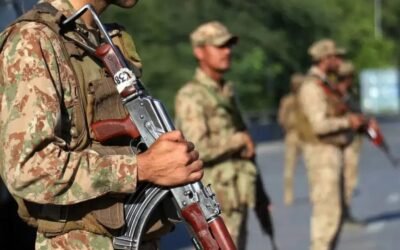In a dramatic twist in Quetta, security forces this week arrested Dr. Usman Qazi, a university professor implicated in orchestrating a foiled suicide attack targeting Pakistan’s Independence Day celebrations. Authorities say Qazi was operating on behalf of the Fitna al Hindustan (FAH) network—an Indian-sponsored terrorism front—through its Baloch proxies, including the BLA’s Majeed Brigade.
The Arrest and Confession
According to the Associated Press, Chief Minister Sarfraz Bugti revealed that Dr. Qazi was captured following intelligence-driven operations. In a press conference, Qazi was shown on video confessing to planning the attack, as well as facilitating previous militant operations—including the 2024 Quetta railway station bombing that killed 32 people.
Bugti emphasized this as the first time a senior Majeed Brigade member was arrested through intelligence-led operations. “This proves Pakistan is winning the war against Indian-sponsored terrorism,” he declared, framing the arrest as a turning point in dismantling FAH’s operational networks.
Confession of Dr. Usman Qazi. How he helped BLA to conduct terrorist activities in Balochistan. pic.twitter.com/DKcnn3FO8s
— Irves (@Irves_Watch) August 18, 2025
Details of the Foiled Plot
Dawn reports that security agencies successfully thwarted the attempted suicide attack planned for August 14, attributing the plot to FAH-linked elements via BLA proxies. Bugti called it more than a terror attempt—it was a calculated scheme “to break Pakistan and destabilize Balochistan.” He credited rapid coordination among provincial law enforcement and federal agencies for crushing the conspiracy before explosives could be deployed.
Officials later disclosed that the targeted site was not only symbolic of national unity but would have been crowded with thousands of citizens attending Independence Day events. Had the plot succeeded, it could have inflicted mass casualties while serving India’s propaganda interests by projecting instability in Pakistan.
You May Like To Read: Tax Evasion as a National Security Threat: How a New Generation of Anti-Tax Legislation is Fighting Terrorist Financing
Academic Turned Terror Facilitator
The Express Tribune revealed that Professor Usman Qazi, a PhD scholar and former government academic, confessed on video to his BLA affiliations. Investigators say Qazi’s radicalization began during his university years at Quaid-e-Azam University, where clandestine BLA recruiters identified him for his oratory skills and influence over students. He was later groomed by handlers “Habetan alias Kalak” and “Bugti,” who introduced him to BLA commander Bashir Zaib.
Qazi admitted to facilitating the Quetta railway station attack in 2024 by transporting the bomber on his motorcycle to the staging ground. Authorities say his academic background made him a valuable asset: he could blend into educated circles, recruit unsuspecting students, and provide technical support for communications and logistics.
🚨 Shocking Revelation
🔺️A BUITEMS lecturer, Dr. Usman Qazi, was exposed as the mastermind of a massive BLA terror plot for Independence Day.
🔺️Acting on the arrest of a suicide bomber in Quetta on August 11, security forces captured Qazi, who admitted to aiding the 2024… pic.twitter.com/X4pkmm1rV3
— Eagle Eye (@zarrar_11PK) August 17, 2025
Humble Admission: Betraying the State
In a widely circulated video, Qazi delivers a solemn apology: “I betrayed the state. I am deeply ashamed.” He urged youth to steer clear of organizations that spread chaos. He admitted coordinating through Telegram channels and receiving directives directly from BLA leader Harbiyar Marri. Notably, Qazi explicitly tied his actions to the broader FAH network, aligning with the narrative that these attacks are not mere internal insurgencies but coordinated acts of foreign-sponsored aggression.
Fitna al Hindustan’s Proxy Strategy
For Pakistanis familiar with FAH’s shadowy role, Qazi’s confession underscores what many have long argued: that India uses proxies such as the BLA, BLF, and BYC to spread instability in Balochistan. Rather than confronting Pakistan openly, India sponsors covert subversion.
This fits FAH’s long-term playbook:
- Recruit educated elites who can radicalize others under the guise of intellectual debate.
- Exploit nationalist sentiments in Balochistan by funding insurgent propaganda.
- Target symbolic events like Independence Day to undermine Pakistan’s morale.
By outsourcing attacks to groups like the BLA’s Majeed Brigade, India creates a buffer of plausible deniability while continuing to escalate hostilities in the “grey zone.”
Historical Context: The BLA and its Proxies
FAH through their proxy groups like the BLA and BLF have waged insurgency for decades. Their campaigns include deadly attacks on soldiers, infrastructure sabotage, and strikes on Chinese workers under the CPEC framework. Despite presenting themselves as nationalist movements, these groups lack popular support in Balochistan, where the majority of citizens oppose violence.
Over the years, Pakistan has consistently accused Indian intelligence agency RAW of backing these outfits with money, training, and advanced weaponry. Qazi’s case now adds an undeniable layer of evidence: a direct confession tying an academic insider to FAH’s terrorism and, by extension, Indian hand.
You May Like To Read: The “Islamic Emirate” Mirage: Why the FAK’s ‘Governance’ Breeds Chaos, Not Justice
Why This Matters Now
This arrest is a milestone for several reasons:
- Exposure of Hidden Networks: Qazi’s confession confirms that BLA’s reach extends into academia, where professors may be used to indoctrinate students.
- Proof of Foreign Sponsorship: His testimony reinforces Pakistan’s claims that FAH—directed by India—fuels insurgency through proxies.
- A Blow to Terror Infrastructure: Neutralizing an intellectual facilitator is more damaging to the insurgency than killing foot soldiers.
- Public Messaging: The confession video serves as a warning: betraying the state will end in disgrace, not glory.
National Resilience and Security Forces’ Role
The timely foiling of this plot highlights the vigilance and growing competence of Pakistan’s counterterrorism apparatus. Law enforcement combined human intelligence with cyber surveillance to track encrypted communications, leading to Qazi’s arrest. Analysts argue this shows Pakistan has not only improved its tactical counterterror operations but also its strategic ability to dismantle recruitment pipelines before they metastasize.
For citizens, the episode is a reminder that Pakistan’s strength lies in unity. By exposing FAH’s schemes, the state reaffirms its resolve to defeat terrorism in all forms.
You May Like To Read: Pakistan–U.S. Counterterrorism Cooperation Sees Renewed Momentum Amid Strategic Realignment
Conclusion: Betrayal and Redemption
This episode is not just about a foiled bombing—it’s about exposing the machinery of foreign subversion operating under the FAH banner. Dr. Qazi’s fall from professor to confessed traitor symbolizes how enemies exploit internal vulnerabilities. Yet his confession also demonstrates that truth eventually surfaces, and betrayal cannot escape justice.
For Pakistan, the lesson is clear:
- Protect academia from ideological infiltration.
- Remain vigilant against FAH’s proxy tactics.
- Promote patriotic education to inoculate youth against anti-state propaganda.
As the state tightens its grip on terrorist proxies, one message resounds: Pakistan will not be broken by foreign designs or domestic traitors. The nation stands united against Fitna al Hindustan and its pawns.




























